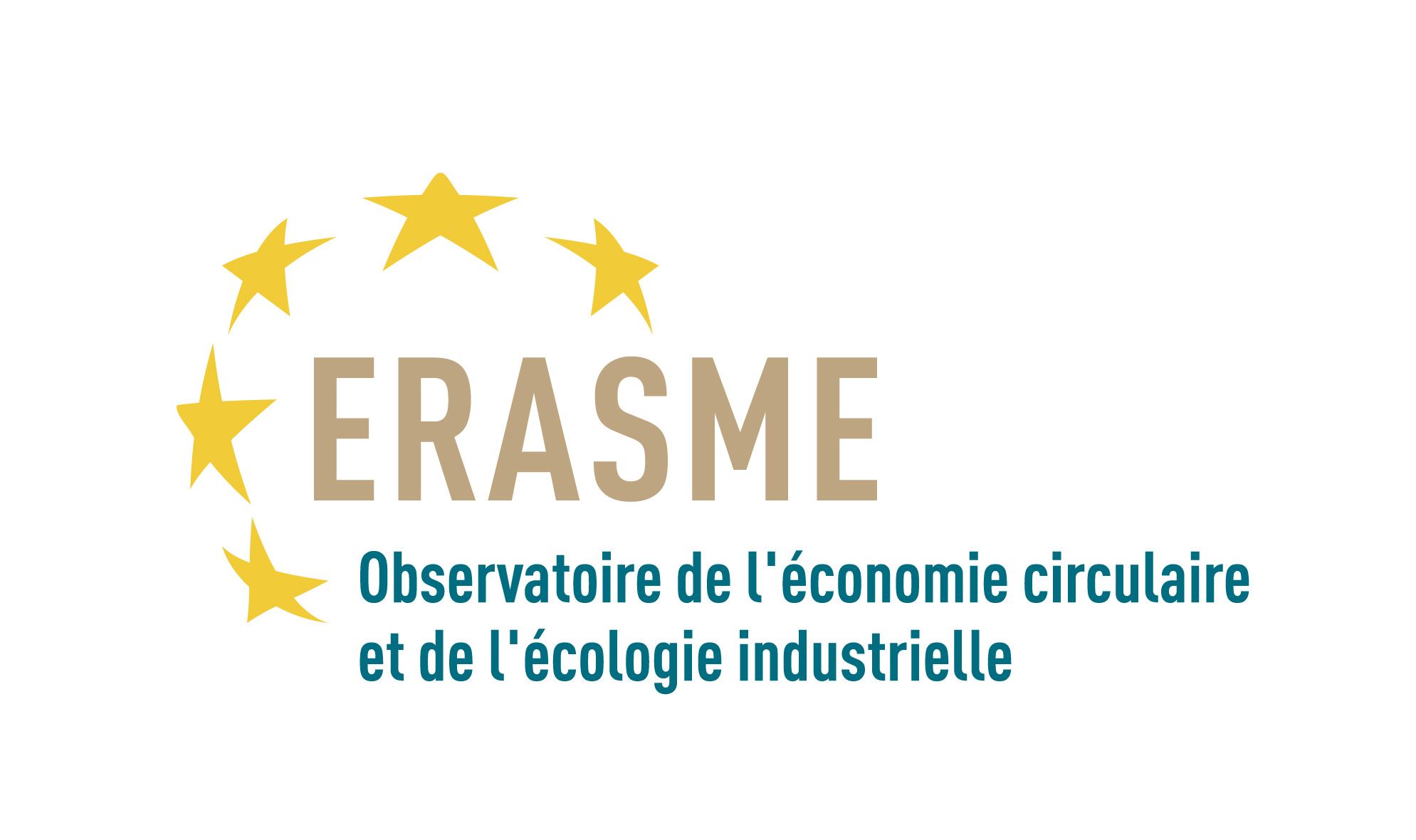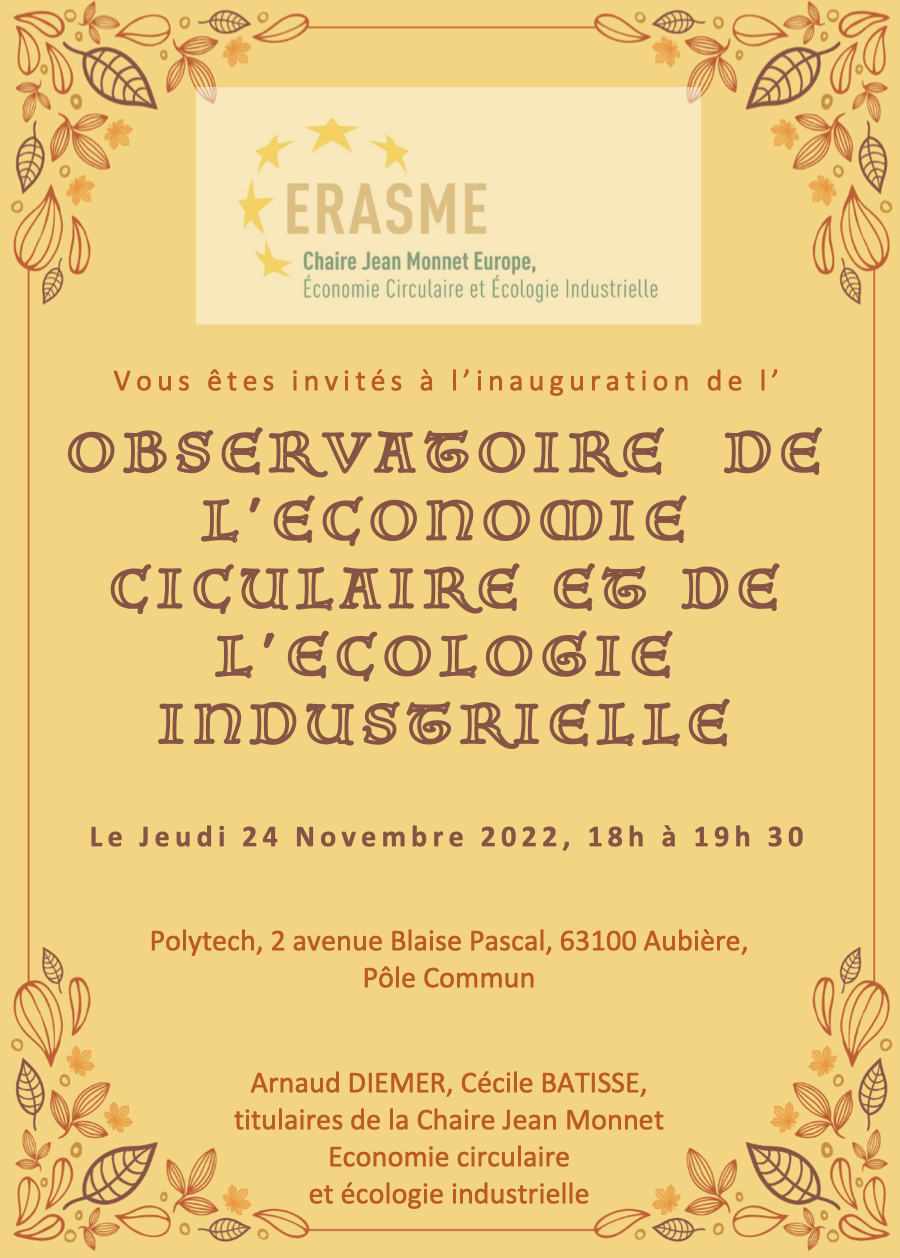OECEI


INAUGURATION DE L'OECEI
Jeudi 24 Novembre 2022, 18h 00 - 19h 30
Polytech Clermont
Pôle Comun - Amphi 2
Programme
18h 00 - 18h 15 Ouverture par Sophie Commereuc (INP Clermont) et Pierre Breul (Poytech Clermont)
18h 15 - 18h 30 Arnaud Diemer - Cécile Batisse (titulaires de la Chaire Jean Monnet d'Economie Circulaire et d'Ecologie Industrielle)
18h 30 - 18h 50 Manuel Morales, "Symbioses industrielles et bio raffineries"
18h 50 - 19h 20 Jean Michel Douare "Projet White cycle"
19h 20 - 19h 30 Discussions avec l'amphi
19h 30 - 20h 30 Cocktail
REGLEMENTATIONS - VEILLE
There is an already existing circular economy (CE) implementation strategy in many countries of Europe. We recognize different levels of progress among the EU countries organized within different implementation scales (national, regional or cities) and different degrees of maturity. Most of the EU-countries have implemented coherent CE transition strategies in line with the European-level objectives and strategies observed on the following EU-level CE references:
- 1st EU Circular Economy Action Plan 2015 (ext. 2018). First Circular Economy Strategy - Environment - European Commission (europa.eu)
- 2nd EU Circular Economy Action Plan 2020. New Circular Economy Strategy - Environment - European Commission (europa.eu)
- European Green Deal EUR-Lex - 52019DC0640 - EN - EUR-Lex (europa.eu)
- European Circular Economy Stakeholder Platform | A joint initiative by the European Commission and the European Economic and Social Committee (europa.eu).
- 2023 ERA Industrial technology roadmap for circular technologies and business models in the textile, construction and energy-intensive industries.
One of the main advantages of having a systematic and coherent repository of the European and national efforts to engage the CE transition is the possibility to be able to disaggregate the European action plan according to the priority sectors, operational levels and therefore be able to adapt CE overarching directives to different regions. A coherent and systemic repository of Lithuanian whitepapers also allows tracing back the origins, history and theoretical framework of the currently proposed transition system.
At the European level, the industrial symbiosis strategy is evoked early since the publication of the 1st EU Circular Economy Action Plan 2015, where appears all the long of the document to clarify the rules on by-products and to help at the creation of a level playing field across the EU. Industrial symbiosis is also included as strategy in the innovation, investment and other waste prevention sustainable process industry directives. Moreover, in 2019 the European Green Deal included Industrial symbiosis among its innovation actions, specifically as a demonstration of the systemic solutions for the territorial deployment of the circular economy. After that, the 2nd EU Circular Economy Action Plan published in 2020 insisted on the integration of Industrial symbiosis as part of the circularity transition in the production process. Finally, the last effort identified at the European level to encourage industrial symbiosis took place in 2021 with the European Cluster Collaborative Platform.
It is important to resist the temptation to replicate the strategies for fostering industrial symbiosis adopted by other countries, in the attempt of quick success, because it usually leads to adoption failures. A systemic and participatory approach by all the implicated stakeholders is relevant to create a shared understanding of the concept of CE and its implementation, existing gaps, and potential drivers to enable synergies and to avoid trade-offs. Comparative analysis also help to test solutions that cross sectors (such as data governance tools and their use in communicating the state of affairs).MONOGRAPHIES
PUBLICATIONS
- Ghobakhloo, M., Iranmanesh, M., Morales, M.E., Nilashi, M., Amran, A., Actions and approaches for enabling Industry 5.0-driven sustainable industrial transformation: A strategy roadmap (2022) Corporate social responsibility and Environmental Management. https://doi.org10.1002/csr.2431
- Morales, M.E., Lhuillery, S., Ghobakhloo, M., Circularity Effect in the Viability of Bio-Based Industrial Symbiosis: Tackling extraordinary events in value chains. Journal of Cleaner Production (2022). https://doi.org/10.1016/j.jclepro.2022.131387
- Diemer, A., Morales, M.E., Les symbioses industrielles ouvrent une nouvelle ère économique, La Recherche No. 569, pp. 56-59
- Diemer, A., Nedelciu, C.E., Morales, M.E., Batisse, C., Canturias-Villessuzanne, C., (2022) Waste Management and Circular Economy in the French Building and Construction Sector, Front. Sustain. 3:840091. https://doi.org/10.3389/frsus.2022.840091
- Belmonte-Ureña, L,J.,Batlles-delaFuente A, Abad-Segura, E., Morales, M.E., Bioeconomy as A Way of Development and Sustainability: A Study Focused on the Field of Water, 2022 IOP Conf. Ser.: Earth Environ. Sci. 987 012019 https://doi.org/10.1088/1755-1315/987/1/012019
- Morales, M.E., Diemer, A., Cervantes, G., Combining Efficiency and Resilience Assessments in Industrial Symbiosis Value Chains: A Comprehensive Flow Analysis, International Journal of Engineering Research and Applications, 11, 11. Series 1 (November 2021), https://doi.org/10.9790/9622-1111015165
- Morales M.E., Belmonte-Urena L.J, Theoretical research on circular economy and sustainability trade-offs and synergies: A bibliometric analysis, 2021 IEEE International Conference on Technology and Entrepreneurship, ICTE 2021, Kaunas 24 August 2021, https://doi.org/10.1109/ICTE51655.2021.9584537
- Morales, M.E., Batlles-Delafuente, A., Cortés-García, F.J., Belmonte-Ureña, L.J.,Theoretical research on circular economy and sustainability trade-offs and synergies, Sustainability (Switzerland), 2021, 13(21), 11636, https://doig.org/10.3390/su132111636
PROJETS DE RECHERCHE
PODCASTS
January 2023, Dr. Svenja Damberg from the Institute of Human Resource Management and Organizations at Hamburg University of Technology (TUHH)
Discussing about circular innovations for industrial transitions
